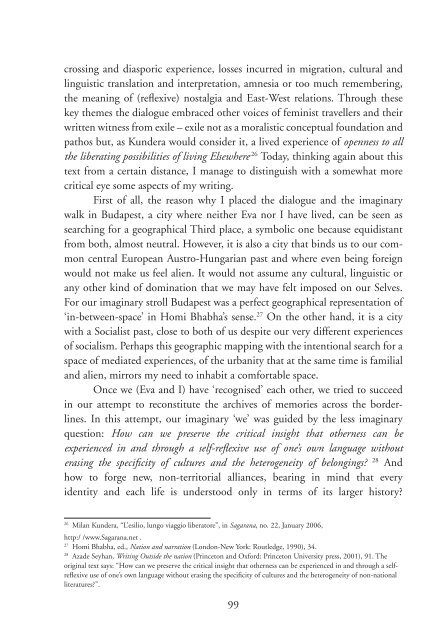Teaching Subjectivity. Travelling Selves for Feminist ... - MailChimp
Teaching Subjectivity. Travelling Selves for Feminist ... - MailChimp
Teaching Subjectivity. Travelling Selves for Feminist ... - MailChimp
Create successful ePaper yourself
Turn your PDF publications into a flip-book with our unique Google optimized e-Paper software.
crossing and diasporic experience, losses incurred in migration, cultural and<br />
linguistic translation and interpretation, amnesia or too much remembering,<br />
the meaning of (reflexive) nostalgia and East-West relations. Through these<br />
key themes the dialogue embraced other voices of feminist travellers and their<br />
written witness from exile – exile not as a moralistic conceptual foundation and<br />
pathos but, as Kundera would consider it, a lived experience of openness to all<br />
the liberating possibilities of living Elsewhere .26 Today, thinking again about this<br />
text from a certain distance, I manage to distinguish with a somewhat more<br />
critical eye some aspects of my writing.<br />
First of all, the reason why I placed the dialogue and the imaginary<br />
walk in Budapest, a city where neither Eva nor I have lived, can be seen as<br />
searching <strong>for</strong> a geographical Third place, a symbolic one because equidistant<br />
from both, almost neutral. However, it is also a city that binds us to our common<br />
central European Austro-Hungarian past and where even being <strong>for</strong>eign<br />
would not make us feel alien. It would not assume any cultural, linguistic or<br />
any other kind of domination that we may have felt imposed on our <strong>Selves</strong>.<br />
For our imaginary stroll Budapest was a perfect geographical representation of<br />
‘in-between-space’ in Homi Bhabha’s sense. 27 On the other hand, it is a city<br />
with a Socialist past, close to both of us despite our very different experiences<br />
of socialism. Perhaps this geographic mapping with the intentional search <strong>for</strong> a<br />
space of mediated experiences, of the urbanity that at the same time is familial<br />
and alien, mirrors my need to inhabit a com<strong>for</strong>table space.<br />
Once we (Eva and I) have ‘recognised’ each other, we tried to succeed<br />
in our attempt to reconstitute the archives of memories across the borderlines.<br />
In this attempt, our imaginary ‘we’ was guided by the less imaginary<br />
question: How can we preserve the critical insight that otherness can be<br />
experienced in and through a self-reflexive use of one’s own language without<br />
erasing the specificity of cultures and the heterogeneity of belongings? 28 And<br />
how to <strong>for</strong>ge new, non-territorial alliances, bearing in mind that every<br />
identity and each life is understood only in terms of its larger history?<br />
26<br />
Milan Kundera, “L’esilio, lungo viaggio liberatore”, in Sagarana, no. 22, January 2006,<br />
http:/ /www.Sagarana.net .<br />
27<br />
Homi Bhabha, ed., Nation and narration (London-New York: Routledge, 1990), 34.<br />
28<br />
Azade Seyhan, Writing Outside the nation (Princeton and Ox<strong>for</strong>d: Princeton University press, 2001), 91. The<br />
original text says: “How can we preserve the critical insight that otherness can be experienced in and through a selfreflexive<br />
use of one’s own language without erasing the specificity of cultures and the heterogeneity of non-national<br />
literatures?”.<br />
99

















